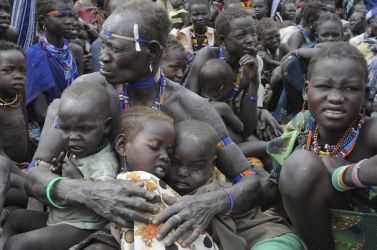FEATURE: Jonglei’s Pibor resumes business after displacement
February 10, 2012 (BOR) – Juma Korok, a 13 year old pupil at Pibor school, goes fishing and hunting for birds using hooks and bows accompanied by his classmates at the river running east of the town that was a the centre of a large scale conflict only a few weeks ago.

On 1 January they advanced on Pibor, the headquarters of Pibor County, setting fire to huts and a health centre ran by medical charity, Medicine San Frontiers (MSF). Many of the burnt down huts remain in disrepair long after the Luo Nuer retreated after the United Nations (UN) and South Sudanese army deployed more forces to the area.
The influx of humanitarian organisations to Pibor county has restored some confidence that the lives of local people can return to normal, Pibor commissioner Joshua Konyi said.
Raids between the two cattle herding communities in June and August last year killed over 1,000, according to the United Nations (UN). So far the UN has been able to confirm only a relatively small number deaths, compared to the 3,000 that the Pibor Commissioner says were killed.
As well as cattle stolen from previous raids, the Luo Nuer and Dinka Bor who attacked Pibor say that they were also motivated to return women and children they say the Murle have abducted.
Jonglei state was flooded with weapons during the decades long north-south civil war that ended with the 2005 Comprehensive Peace Agreement giving South Sudan the right to secede, an option it took overwhelmingly in a referendum last year.
The recent inter-tribal clashes, including counter raids by the Murle, have left 140,000 people requiring humanitarian assistance.
Like other counties in Jonglei state, Pibor county has no road connection with the state’s capital Bor. Only the United Nations Mission in South Sudan (UNMISS) are able to easily reach the county headquarters using helicopters.
Unlike early January, where misery and anxiety over safety from further attacks welcomed visiting delegates, people’s lives continue to normalise in Pibor, authorities say.
“Most of the IDPs [internally displace persons] are returning to their villages and only few people are still here,” Pibor county commissioner Joshua Konyi told reporters at Pibor airstrip on Thursday.
“There is enough police and [South Sudanese] army in the county and people feel safer,” he said, speaking Arabic.
Inhabited by the Murle, Kachipo and Jie tribes, Pibor county is ethnically diverse compared to other counties in Jonglei state. But the Murle are the more well known as they are repeatedly accused of involvement in cattle raids and child abduction against the Dinka Bor and Nuer to the west and north respectively.
This week some members of the Murle tribe called for the county to seceded from Jonglei and become a state in its own right. Jonglei is by far the largest of South Sudan’s ten states.
Meeting the European Union Special Representative to South Sudan and Sudan, Rosalind Marsden, Murle traditional leaders accused the Jonglei state government of encouraging tribalism by claiming that all attacks on their county are engineered in Bor, the capital of Jonglei state.
Sudan Tribune has not been able to independently verify the claim.
FISHING AND HUNTING
In Pibor town, business goes on as usual. The market is flooded by women bring firewood and grass for thatching huts. Girls whose necks are crowned by beads of several colours and young men with dotted marks on their shoulders and upper arm move gently from shop to shop looking for things to buy.
At the banks of river, just east of the market, children go fishing. After throwing his fishing hook five times, a young boy, who couldn’t communicate with Sudan Tribune’s reporter due to a language barrier, caught a Blaria fish.
Another boy, who identified himself as Juma Korok managed to speak with the Sudan Tribune using South Sudanese colloquial Arabic, said that many of the boys his age in Pibor has been displaced by the recent fighting.
“I am in primary one but these boys came from the village because of the fear,” Korok said, jokingly holding his hunting bow and fingers crossed.
In Pibor town, young people gather to chat under trees or play cards and other games, symptomatic of the lack of activities for youth across Jonglei state.
These convergences of jobless youth, even with education, are also numerous in Bor, the capital of Jonglei state.
INVESTING IN JONGLEI
Foreign investors may have been deterred by inter-tribal conflict but the government is hopeful that it can create jobs for young people.
Returning from Juba on Thursday after a week long meeting with investors, Jonglei Governor Kuol Manyang Juuk, said the the investors had not been thrilled by the reports of insecurity.
“We will wait to see how serious they are. [But] according to their talks, they seem to be serious investors who want to come in spite of insecurity they hear in Jonglei,” Governor Kuol told reporters at his arrival at Bor airstrip on Thursday.
Whether, if they do invest in Jonglei, such investment would create opportunities for youth, which could discourage them from pursuing cattle raiding and using their gun as a means to a livelihood is unclear.
Local people are waiting to hear when the promised disarmament will commence as reports of fighting continue to a regular basis.
But in Pibor town, the frequent visitations of high profile delegations, including the European Union Special Representative to South Sudan and Sudan on Thursday, has given some people hope that international community and the government are taking serious steps to end the cycle of violence.
A recent Human Rights Watch report called on the government to investigate the violence and bring those responsible to justice.
(ST)
